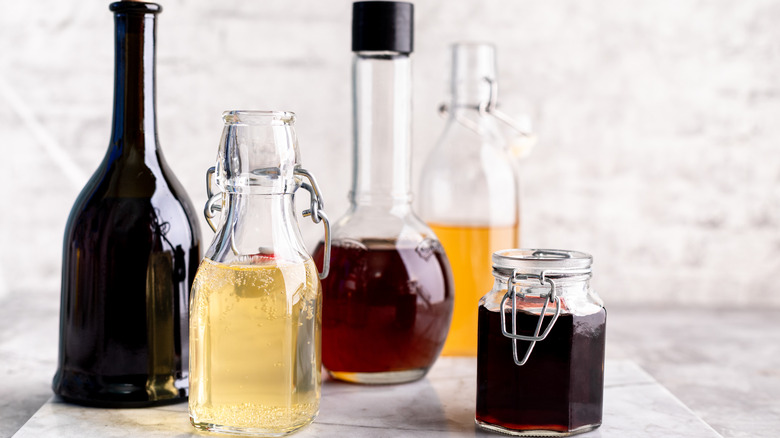The Best Replacements For White Wine Vinegar
Vinegar is a versatile kitchen staple every cook should have on hand. All vinegars are made by transforming sugar into alcohol, which is subsequently fermented by certain strains of bacteria into acetic acid. Because the source of sugar used can vary widely, different types of vinegar have very different flavors, colors, and acidity profiles.
Whether making your own unfiltered version with the mother of vinegar or buying the clarified version at the store, it's essential to understand how each vinegar — and any potential substitutes — can change the recipe's look and flavor. For example, switching up white balsamic vinegar instead of regular balsamic vinegar will contribute to the same tart fruitiness without adding that dark, muddy hue.
One popular choice among vinegar connoisseurs is white wine vinegar, which shines for its contrasting flavor notes of bright yet sweet. With an almost fruity quality, despite its tanginess, white wine vinegar works well for light summertime dishes. Think marinades for fish or homemade dressings for garden-fresh salads. It also contributes almost no calories or sodium and is gluten-free, fitting into virtually any diet plan.
But what if this delicious staple is missing from your shelf? No worries; here are a few excellent replacements.
Best options to match flavor and acidity
If you're looking for the closest cousin to white wine vinegar in terms of taste, reach for champagne vinegar. This option mimics white wine vinegar's fruity flavor but is lighter and more delicate. Because of its subtlety, it won't overpower your main ingredient with excess acidity or tartness. On the same token, though, its flavor can easily get lost among stronger-tasting ingredients such as caramelized onions or aged cheeses. You'll want to save this vinegar for mild dishes that need a pop of floral sweetness, like dill tuna patties with cucumber cream sauce.
On the other hand, if you're trying to match white wine vinegar's neutral color and relatively high acidity, rice wine vinegar is your best bet. Like its white wine-based cousin, rice wine vinegar is yellowish clear — about the same shade as canola oil or corn syrup. For that reason, you don't have to worry about staining your dish purple (I'm looking at you, red wine vinegar) or darkening your brightly colored veggies. After all, we eat with our eyes first.
Most convenient replacements to use right now
Now, if you're on the frugal side, you probably don't want to go out and buy an entire bottle of white wine vinegar for just one recipe. Fortunately, there's a good substitute you probably already have in your kitchen right now: apple cider vinegar. Apple cider vinegar's potential health benefits for cholesterol and blood sugar levels show promise. But its accessibility and versatility are enough in and of themselves to earn it a spot on your pantry shelf. Compared to white wine vinegar, apple cider vinegar will be noticeably more tart, so either decrease the amount you add or reserve it for more robust, spicier dishes.
And finally, let's say you aren't just out of white wine vinegar, but all vinegar. Well, you don't have to omit that tart twist altogether. Lemon juice can salvage almost any recipe that uses vinegar for its acidic edge. You can't beat lemon juice for its availability; any grocery store will carry it. Fresh is best in terms of flavor, but even the bottled stuff works in a pinch to contribute a necessary acidic twang. This replacement works because lemon juice's pH (i.e., its acidity or alkalinity) closely matches white wine vinegar's.
Whichever type of vinegar you choose can elevate your recipe's interest and brighten up bland flavors. Don't let an empty slot in your vinegar lineup stop you from enjoying its many virtues.


